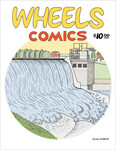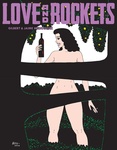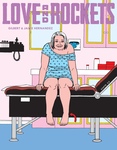
Orignally published in 2006, this was the final installment of the "Project Trilogy" which provided the (then) up-and-coming generation of cartoonists a great opportunity to work with traditional comics themes. Inititated by Project: Telstar, which dealt with science fiction themes with a focus on robots, and continued by Project: Superior, which had super heroics as its unifying theme, this time around, as the title suggests, the same generation of cartoonists is given a chance to tackle the romance comics genre. As with the first two anthologies, the works assembled here bear little semblance to their generic progentiors in the mainstream comics of yore, a guided tour of which we are given in the introductory essay by Bill Boichel (which is currently available online as a downloadable PDF, HERE ). "True" romance seems mostly a thing of the past in the stories that follow, which here primarily focus on -- at best -- snatching a moment of happiness with a fellow being. Many of the pieces center on unrequited love, heartbreak, romantic disaster, murder, mayhem and confusion. Sometimes it's played for laughs and sometimes for tears. Exceptions include Aaron Renier's "Reflectors and Rutabegas," which comes closest to being a traditional romance, and McGovern & Leandri's Dr. Id story, which employs a 1960s-Dr.-Strange-as-sex-therapist narrative that is certainly traditional in its form, if not in its content. As with all AdHouse Books, the production values are excellent and the quality of the artwork is uniformly high. Stand-outs for us include the contributions of Paul Rivoche, Hope Larson, Roger Petersen and Junko Mizuno, but doubtless every reader of this anthology will find their own favorites. And there's no way we can avoid singling out Robert Goodin's contribution: if there were an award for excellence in the service of perversion, this one would have the comics category all wrapped up. PLEASE NOTE: This is the limited edition hardcover edition that we are offering here. Limited to 500 individually numbered copies, it features front and back covers, as well as endpapers that consist of four apocryphal romance comic book covers featuring Afrodisiac, all by Pittsburgh's own megatalent, Jim Rugg!
NOW ON SPECIAL – need we say it? – while supplies last!
(LIMIT: ONE PER CUSTOMER)

This work of graphic history is "based on the New York Times bestseller". It has been adapted by Chuck Dixon and illustrated by Paul Rivoche. Unless we've missed something, The Forgotten Man marks the single most significant comics work in the career of Mr. X co-creator, Paul Rivoche. This Canadian artist has here turned in a great piece of comics work that makes for an informative and engaging read in providing some interesting aspects of the Great Depression as well as the years leading up to it. However, it appears as though this work was intended as a polemic in support of a "new history" of this era that is supposed to overturn readers received notions related to this period in American – and world – history. In this regard, The Forgotten Man makes for a fascinating look into the psychology of those embracing this revisionist view of history. It appears as though the creators of this work take it as self-evident that readers of The Forgotten Man will come away from reading this with their eyes opened to the value and importance of this "new history" and will realize... something; it's hard to say what they were thinking. The actual take away from this book is fairly different. It is clear that the creators are partisans who identify with the "forgotten man" and have their differences with the policies that steered the USA through the depression. They have put together an immense cast of characters and struggle to do their best to show how they are related, but while the characters themselves are well delineated, the construction of their relationships with each other and the overall flow of history are thoroughly muddled and superficial, at best, and reveal that the authors of this work possess a remarkably poor grasp of historical forces and processes, which together with a moral naiveté combine to create a disturbingly solipsistic world view that heartily embraces self-pity; unless, of course, this graphic edition was actually intended as a work of irony along the lines of Robert Altman's Nashville, in which case we say, bravo, well done! Worthy of special note is Wendell Willkie masquerading as Dick Tracy (on page 210). Given the graphic similarities of Chester Gould's star creation to caricatures of Ronald Reagan, this homage seemed especially apt. Taken as a whole, the big plus is that there is enough ambiguity on hand here to make it possible for any comics reader to enjoy the classic old school comics story telling on hand here in this history of the era which, not coincidentally, gave birth to the comic book.










